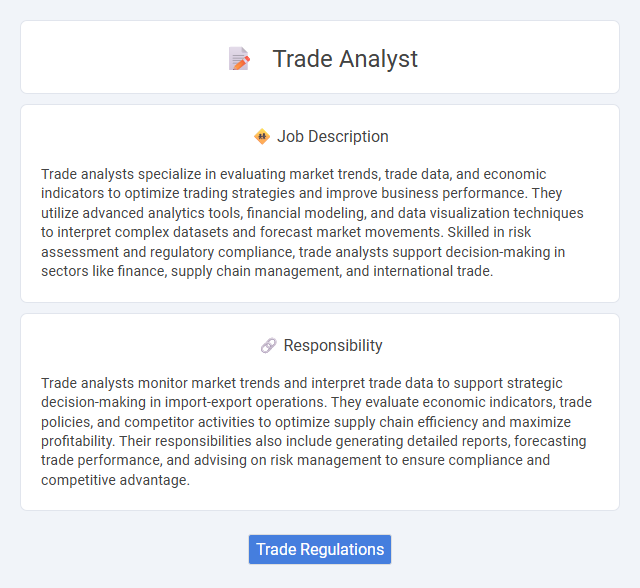
Trade analysts specialize in evaluating market trends, trade data, and economic indicators to optimize trading strategies and improve business performance. They utilize advanced analytics tools, financial modeling, and data visualization techniques to interpret complex datasets and forecast market movements. Skilled in risk assessment and regulatory compliance, trade analysts support decision-making in sectors like finance, supply chain management, and international trade.
Individuals with strong analytical skills and a keen interest in market trends will likely find a trade analyst role suitable. Those who thrive in fast-paced environments and can interpret large datasets to make informed decisions may demonstrate a higher probability of success. People who prefer routine tasks and minimal interaction with fluctuating market conditions might face challenges adapting to this position.
Qualification
A trade analyst typically requires a bachelor's degree in economics, finance, business administration, or a related field, accompanied by strong analytical and quantitative skills. Proficiency in data analysis tools such as Excel, SQL, and statistical software, along with knowledge of international trade regulations and market trends, is essential. Certifications like Certified Trade Analyst (CTA) or relevant industry-specific credentials can enhance job prospects and credibility in the role.
Responsibility
Trade analysts monitor market trends and interpret trade data to support strategic decision-making in import-export operations. They evaluate economic indicators, trade policies, and competitor activities to optimize supply chain efficiency and maximize profitability. Their responsibilities also include generating detailed reports, forecasting trade performance, and advising on risk management to ensure compliance and competitive advantage.
Benefit
Trade analysts likely provide significant benefits by identifying market trends and forecasting potential risks, which can improve decision-making and profitability for businesses. Their insights probably help optimize supply chain strategies and enhance competitive advantage in dynamic markets. Employing a trade analyst may increase efficiency and reduce costs through data-driven recommendations.
Challenge
Trade analyst roles likely involve complex data interpretation and market trend analysis that can present constant challenges. The probability of encountering rapidly shifting economic conditions requires strong adaptability and analytical skills. Navigating regulatory changes and ensuring accurate forecast models may add further difficulty to the position.
Career Advancement
Trade analysts play a crucial role in interpreting market data and forecasting trends to guide strategic business decisions, positioning themselves for rapid career advancement into senior trading, market research, or financial consulting roles. Mastery of data analytics tools and strong understanding of global trade regulations enhance opportunities for promotion to leadership positions such as trade manager or supply chain director. Continuous professional development through certifications like Certified Trade Finance Professional (CTFP) significantly boosts prospects in competitive international trade environments.
Key Terms
Trade Regulations
Trade analysts specializing in trade regulations evaluate international trade policies, tariffs, and compliance requirements to ensure companies adhere to legal standards and avoid penalties. They analyze changes in import/export laws, monitor regulatory updates from organizations like the World Trade Organization (WTO), and assess the impact of trade agreements such as NAFTA or the USMCA. Expertise in customs regulations, trade tariffs, and non-tariff barriers enables trade analysts to optimize global supply chains and support strategic decision-making.
 kuljobs.com
kuljobs.com